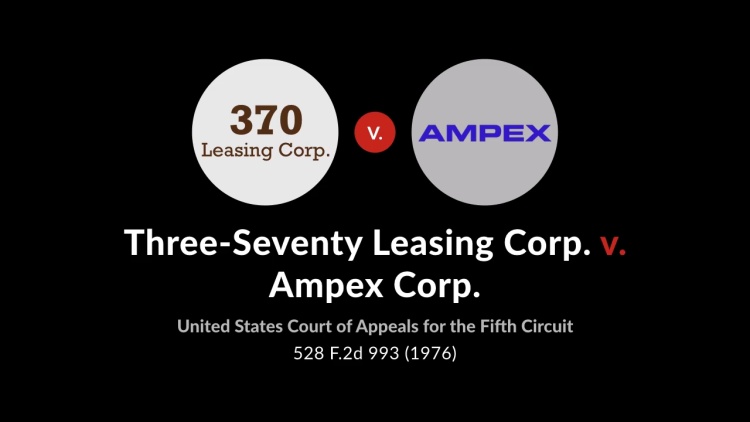Three-Seventy Leasing Corp. v. Ampex Corp.
United States Court of Appeals for the Fifth Circuit
528 F.2d 993 (1976)
- Written by Ronald Quirk, JD
Facts
Three-Seventy Leasing Corporation (370) (plaintiff), which buys computer hardware for lease to end-users, sued Ampex Corporation (Ampex) (defendant) for breach of contract to purchase computer core memories. After a meeting between 370’s sole employee, Joyce, Ampex salesman Kays, and Kays’ boss, Mueller, the parties commenced negotiations which resulted in Kays giving Joyce a written document containing the terms of sale of memory units from Ampex to 370. The document had signature blocks for a representative of each party to sign. Joyce signed on behalf of 370, but no one from Ampex signed the document. Shortly after Joyce signed the document, Mueller circulated an intra-office memorandum stating that Ampex had an agreement with 370 for the purchase of computer core memories, and that at Joyce’s request all communications with 370 concerning the sale would be handled through Kays. A few days later, Kays sent a letter to Joyce confirming the delivery dates and installation instructions for the core memories. At trial, Ampex contended that the only employees who had authority to enter into a contract were Ampex’s contract manager or supervisor, not salespeople. The district court nonetheless held that an enforceable contract existed between the parties.
Rule of Law
Issue
Holding and Reasoning (Dyer, J.)
What to do next…
Here's why 899,000 law students have relied on our case briefs:
- Written by law professors and practitioners, not other law students. 47,000 briefs, keyed to 994 casebooks. Top-notch customer support.
- The right amount of information, includes the facts, issues, rule of law, holding and reasoning, and any concurrences and dissents.
- Access in your classes, works on your mobile and tablet. Massive library of related video lessons and high quality multiple-choice questions.
- Easy to use, uniform format for every case brief. Written in plain English, not in legalese. Our briefs summarize and simplify; they don’t just repeat the court’s language.





